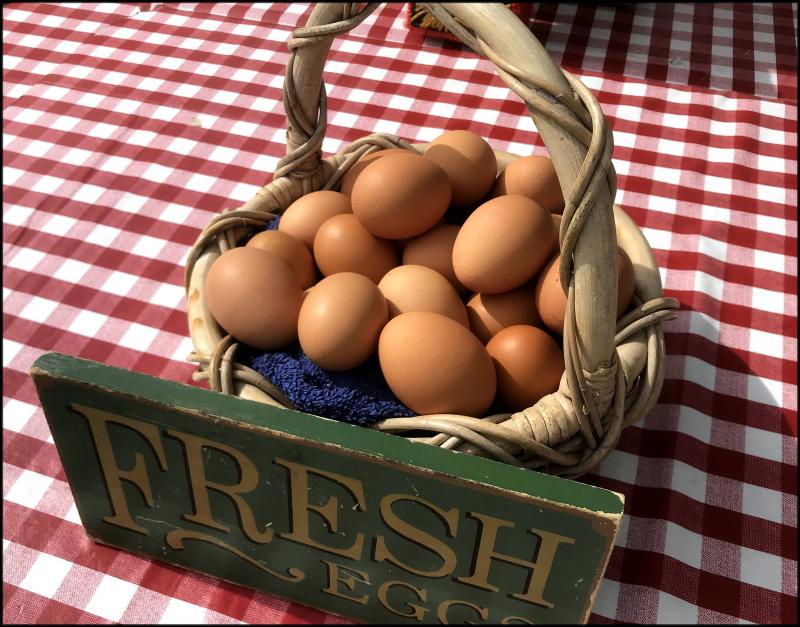Duck eggs pack a punch
For all the years I've visited the Historic Lewes Farmers Market and for all the times I've visited the Duck Lady's table to buy eggs, I'd never purchased duck eggs until last month. When I asked her about the difference between duck and hen eggs, she gave me quite a list of attributes.
To begin, duck eggs are quite a bit larger than chicken eggs, almost a third larger than jumbo eggs. Their color varies depending on the breed of duck, ranging from grey to brown to the light green color of the eggs I bought. She explained what to expect when I brought them home.
First, their shells are significantly thicker than the shells of hen eggs, and the membrane inside the shell is thicker, which can make it tricky to crack. These features also give duck eggs a longer shelf life. Inside, you'll find the white is almost transparent and the yolk is much larger. Because of this larger yolk, duck eggs are higher in both fat and cholesterol than chicken eggs.
However, they're also higher in protein and have a higher concentration of omega-3 fatty acids, primarily due to the ducks' diet of bugs, snails and slugs instead of plants. This also affects their flavor, which is more reliably intense than a chicken egg. A scrambled duck egg will be much creamier and richer than a chicken egg.
You can cook duck eggs the same way you'd cook chicken eggs. With its larger size and higher fat content, a recipe designed for a chicken egg won't always work with a duck egg substitution. They fry well, poach well and boil well, but if you want to bake with them, you'll need to figure out just how much of a duck egg to use.
Duck eggs are prized for baking. Some recipes suggest substituting duck eggs for chicken eggs one-for-one. Others suggest adding some liquid to compensate for the smaller amount of white in the duck egg. My approach is to find a recipe that has been well tested to ensure the number of duck eggs will work.
I've included a recipe for sponge cake made with duck eggs. This will be a richer yellow color than a traditional sponge cake and will rise a bit higher than one made with chicken eggs. Be sure to allow the duck eggs come to room temperature before mixing them into the batter.
The recipe for duck egg brownies delivers a moist, rich result. Lining the pan with foil makes it easier to get the brownies out. The key to fudgy brownies is to undercook them ever so slightly. When you use a cake tester, it will come out with tiny bits stuck to it, letting you know they're done, but not dry.
One of the popular ways to use duck eggs in Chinese cuisine is to brine them for 30 to 40 days in highly salted water. Over time, the white becomes super-salty (not so delicious to me), but the yolk becomes a silky, rich delicacy. The eggs are boiled before they're eaten or added to another dish.
If you'd like to try your hand at making salted duck eggs, I've included a recipe here. You'll also find them for sale at gourmet specialty shops and Oriental markets. If you're looking for an egg that has a much bigger and richer yolk, a higher concentration of nutrients and more protein than the standard hen's egg, try a duck egg.
Duck Egg Sponge Cake
2 1/4 C flour
2 1/2 t baking powder
1/4 t salt
4 duck eggs*
1 1/2 C sugar
1 C milk
2 T butter
1 t vanilla extract
1/4 t almond extract
Preheat oven to 350F. Coat the bottom of two 9-inch round cake pans with nonstick cooking spray. Line the bottoms with parchment paper; set aside. Sift flour, baking powder and salt into a medium bowl; set aside. With an electric mixer fitted with a whisk attachment, beat the eggs together on medium speed in a large mixing bowl. Increase the speed to medium-high and beat until the eggs are foamy. Gradually add the sugar, continuing to beat until they become lemony-colored and thick, about 5 minutes. While the eggs are beating, combine milk and butter in a small saucepan over medium heat; cook until the butter is melted and the milk is not quite boiling. Remove from heat and stir in vanilla and almond extracts. Reduce the mixer speed to its lowest setting and add the dry ingredients to the egg-sugar mixture, mixing just until combined. Pour in the milk mixture, mixing just to combine; do not overbeat. Divide the batter between the two prepared pans and bake until the cakes are golden brown and spring back when touched lightly, about 25-30 minutes. Allow the cakes to cool in their pans for 10 minutes, then turn out onto wire racks and cool completely before serving. Frost with buttercream icing, lemon glaze or serve with strawberries and whipped cream. *Note: allow eggs to come to room temperature before using.
Duck Egg Brownies
1 1/2 C unsalted butter
1 1/4 C unsweetened cocoa powder
2 3/4 C sugar
1/2 t salt
4 duck eggs
2 t vanilla extract
1 2/3 C flour
1/2 C chopped dark chocolate
Preheat oven to 325 F. Line the bottom and sides of a 9-by-13-inch baking pan with aluminum foil, leaving about a 2-inch overhang on the short sides. Coat the foil with nonstick cooking spray; set aside. Chop the butter into 1-inch pieces and place in a large saucepan over medium low, stirring occasionally until melted.
Remove pan from heat and whisk in cocoa powder, stirring until smooth. Add the sugar and salt; stir until combined. Add eggs one at a time and stir just until blended.
Add vanilla and stir to combine. Sift the flour over the batter and stir just until smooth. Pour the batter into the prepared pan and smooth with a spatula. Scatter the chopped chocolate over the top.
Bake until a toothpick inserted in the center comes out with tiny bits of brownie sticking to it, about 35 to 40 minutes. Cool the brownies completely in the pan on a rack for at least 3 hours. When the brownies are cool, use the foil overhang to lift them from the pan. Invert onto a cutting board and carefully peel away the foil. Flip again and cut into 24 squares.
Salted Duck Eggs
4 C water
1 C sea salt
6 duck eggs
Bring water to a boil in a large saucepan. Remove from heat and add salt, stirring until dissolved; allow to cool. Wash eggs under cool water to remove any dirt. Place eggs in a clean jar just large enough to hold them. Pour brine into jar, making sure to completely submerge the eggs.
Seal jar with an airtight lid. Set jar in a cool place away from sunlight for 30 days. To complete the process, cook eggs in boiling water for 15 minutes. The yolk will be crumbly, oily and a bright yellow-orange color. You can eat the yolk on its own, mix it into a stir-fry or use to replace raw eggs in pasta carbonara.






















































